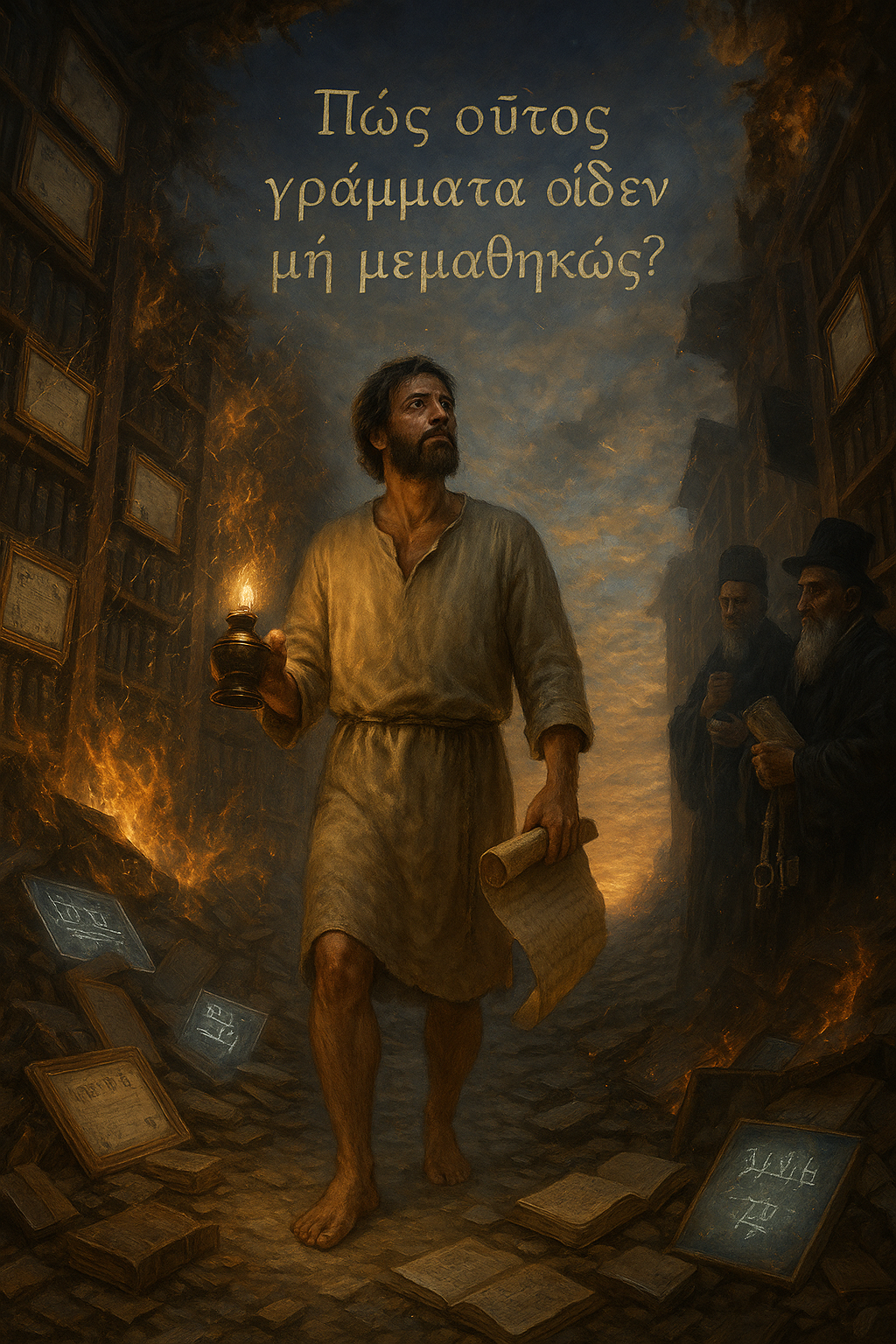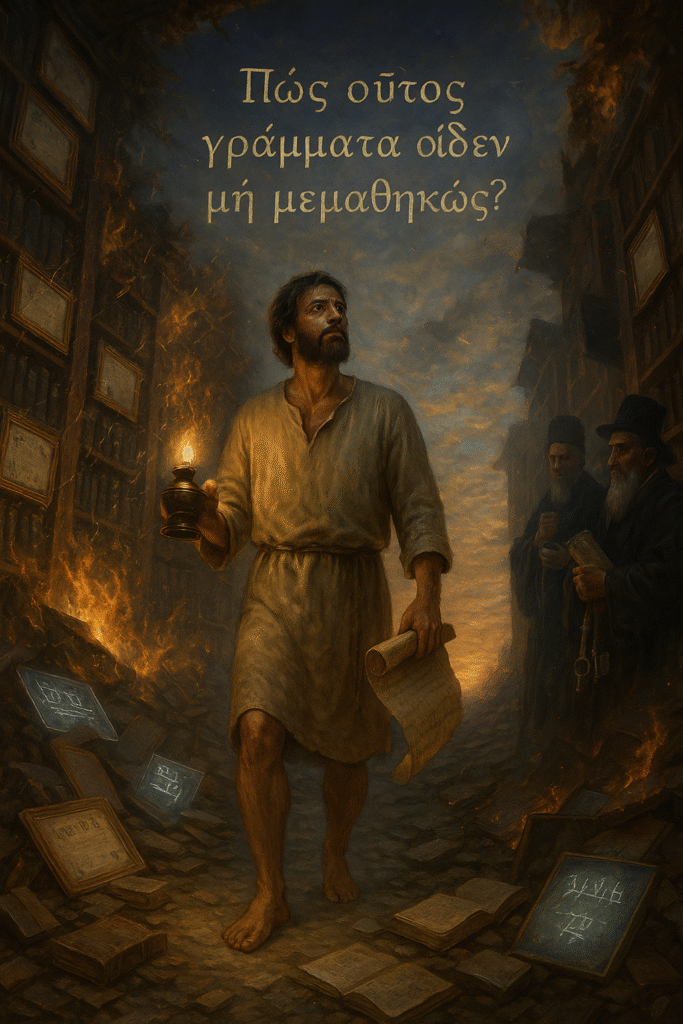Physical Address
304 North Cardinal St.
Dorchester Center, MA 02124
Physical Address
304 North Cardinal St.
Dorchester Center, MA 02124
With Michael Walker
With Michael Walker

To Those who guard the gate, yet they themselves do not enter….

It doesn’t take a scholar, and the very suggestion that it does is the laughable excuse of a gatekeeper who trembles at the idea that the Word of God might actually belong to the ordinary man, the common woman, the one without the framed certificate on the wall, the one without the mountain of student loan debt, the one without the prestigious title. The insult is always the same: “you’re not a scholar, so what do you know?” And the reply is as simple as it is devastating: I know that no in Spanish means no in English, and I do not require an ivory tower degree to grasp that simple truth. I do not require a diploma to know how to read. I do not require the stamp of an institution to see the difference between a counterfeit tradition and a text plainly given. And if that offends the self-appointed gatekeepers, then perhaps it is because their power rests not in truth but in intimidation. I know that Yehoshua was not a fan of scholars, Pharisees and Sadducees…
Scripture itself exposes the fraud of credential worship. The Messiah Himself said in Matthew twenty-three that the scribes and Pharisees shut the door of the kingdom of heaven in people’s faces and they themselves would not enter. Luke chapter eleven verse fifty-two declared woe to those who took away the key of knowledge. Acts chapter four shows Peter and John recognized as uneducated and ordinary men, yet those men spoke with authority that confounded the council. John seven testifies that Yehoshua was asked how He knew letters, having never studied at their schools. First Corinthians chapter one proclaims that God chose the foolish things of the world to shame the wise. This is not my opinion; this is the very record of Scripture. And if the Father Himself delights in revealing His secrets to infants while concealing them from the so-called wise and intelligent, then who exactly are you to stand at the door and demand credentials?
The laughable irony is that the very people who wield the insult of “not a scholar” are themselves exposed by their own lack of diligence. Acts chapter seventeen verse eleven commends the Bereans who examined the Scriptures daily, not the scholars with their titles, but ordinary men and women who opened scrolls and tested every word. Second Timothy chapter two commands us to be diligent and rightly handle the word of truth. James tells us to ask for wisdom, and it will be given generously. Deuteronomy thirty says the word is not far off in heaven or across the sea but very near to you, in your mouth and in your heart. Psalm nineteen proclaims that the testimony of Yahweh makes wise the simple, and Psalm one hundred nineteen adds that the unfolding of His words gives light and understanding to the simple. In other words, Scripture itself testifies that access to truth does not hinge on institutional status, it hinges on the willingness to open the Word.
Tradition is the counterfeit currency that gatekeepers spend to appear authoritative. Mark chapter seven declares that by their traditions they nullify the Word of God. Colossians two warns against empty philosophy according to human tradition and not according to Messiah. The same spirit lives today when someone demands a diploma before you dare to speak about what is plainly written. But the truth does not require an institution’s signature, and tradition cannot compete with text that is freely given. It is like someone insisting you need a doctorate to know water is wet, when the substance is already in your hands, ready to be touched and tasted. The Word is wet, living water, and you can drink it without permission.
And today the evidence is even stronger. We live in an age where the Dead Sea Scrolls are digitized and freely viewable online. You can open Codex Sinaiticus and zoom into the ink strokes of a scribe from the fourth century. You can scroll through Codex Vaticanus without leaving your chair. You can download the SBL Greek New Testament, access the Open Scriptures Hebrew Bible, and click a single word to see its lemma, its morphology, its concordance references. Tools like HALOT and BDAG stand as gold-standard lexicons, and though they are reference works produced in academic halls, they are accessible to anyone who dares to use them. This is not hidden knowledge, it is public. This is not locked behind gates, it is freely available. You don’t need a scholar to hold your hand; you need integrity and five minutes of attention span.
Exhibit A is my own work, my archive of two hundred fifty-three published deep dives on The Walk and The Word, totaling over three hundred sixty-seven thousand words, an average of nearly fifteen hundred words per entry, with some approaching six thousand words each. That is the equivalent of over seven hundred thirty pages at five hundred words a page, or over twelve hundred pages if printed denser at three hundred words a page. In other words, the length of a full-blown academic tome has already been written without the so-called scholar’s blessing. And what fills those pages? Word studies from HALOT and BDAG, Cube reconstructions of Hebrew letters, numbers, and pictographs, Unzip breakdowns of Greek morphology, manuscript awareness from Dead Sea Scrolls to Sinaiticus to Vaticanus, NASB anchoring with the covenant Names Yahweh and Yehoshua preserved, and repeated denunciations of credential idolatry. That archive itself is the refutation of the gatekeeper’s sneer. If it takes a scholar, then how has this work already been accomplished, checked, and made public? The answer is obvious: it does not take a scholar, it takes obedience, hunger, and the Spirit of truth.
Common sense is more powerful than the illusions of academia. To demand that one needs a degree to say no means no is as absurd as saying you need a culinary license to know the difference between salt and sugar. You taste it, you know. To insist that one must pay for years of tuition to know that Yehoshua’s name means Yahweh saves is as foolish as requiring a certificate to tell a sunrise from a sunset. The light is plain, and the difference is obvious. The scholar demands applause for discovering the wheel, while the child simply rolls it. And what of those who cry that manuscripts are too technical, that lexicons are too intimidating? That excuse is the coward’s refuge. You need only point and click to confirm a lemma, you need only glance at a page to see the ink, you need only read the entry to see the semantic range. It is easier than balancing your checkbook, and yet they would rather you believe it is impossible.
Anticipate their objections and laugh. “But you are not a scholar.” Neither were Peter and John, and yet they turned the world upside down. “But lexicons are expensive.” Libraries exist, and digital access exists, and my own posts show the method can be replicated with free resources. “But manuscripts are too technical.” Only if you fear your own eyes. The ordinary believer can zoom into a scanned codex and see a word as clearly as the scholar can. The truth is their objection is not about difficulty, it is about control. If you see for yourself, you will no longer need them to hold the keys, and that is their terror.
So here is the call to action, not as a gentle invitation but as a taunt. Tonight, open John chapter seven verse fifteen. Look at the key verb for “know letters.” Click it, read the lexical range in BDAG, look at the surrounding verses, and then tell me what you see. You will find that Yehoshua was mocked for not having their credential, yet He spoke with authority they could not deny. And when you verify this yourself, when you trace it word by word, you will know firsthand that you do not need a permission slip to love the truth. If you cannot do this, the fault is not lack of access, it is lack of will. The tools are there, the manuscripts are there, the Spirit is there, the hunger is either present, or it is not. And the one who mocks you for not being a scholar has already lost, because the very act of opening the Word without them proves the point.
The truth is that this entire debate is comically absurd. Demanding a degree to engage Scripture is like demanding a passport to walk across your own living room. The Word was given to you, near you, in your mouth and in your heart, not parceled out by institutions. And when you strip away the costumes, the titles, the framed paper, what remains is a body of ordinary men and women who by simple obedience put the gatekeepers to shame. You can cling to your diploma if you like, but I will cling to the Word that makes wise the simple. And the record of over three hundred sixty-seven thousand words, twelve hundred pages of sustained deep dives, is the loud testimony that I do not need your permission to know, to speak, and to demonstrate. It doesn’t take a scholar, it never did, and the only ones still saying so are the ones terrified of being exposed as irrelevant.